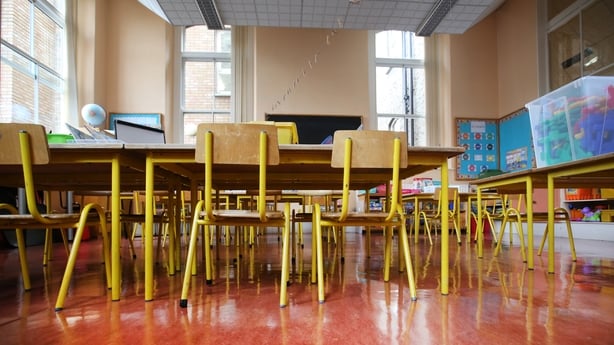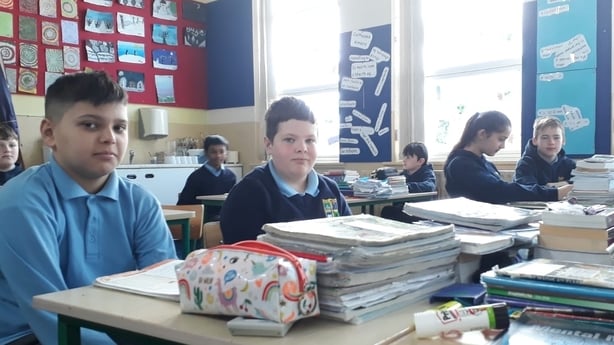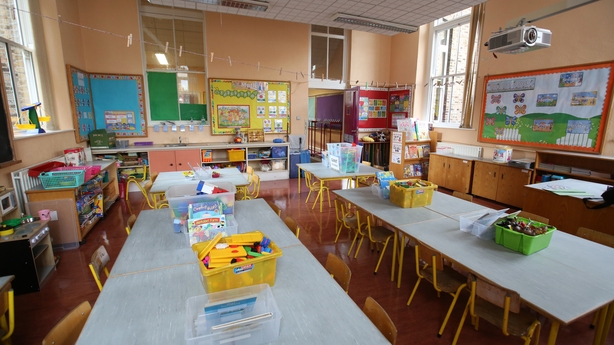The General Secretary of the INTO has said teachers are equipped to deal with the integration of Ukrainian children into Irish classrooms, but warned that the scale of integration is going to be huge and children will need more supports.
Speaking on RTÉ's This Week programme, John Boyle said it was the "fastest and biggest displacement of children since the Second World War".
Mr Boyle also welcomed the Taoiseach's commitment to transfer money from the Covid reserve fund to help arriving children. Micheál Martin has said 2,000 students have already enrolled in primary schools, with 1,800 attending classes in secondary schools.
Mr Boyle said primary schools were under less pressure because enrolment is currently 25,000 below peak, but that some places in Dublin were busier than others. Nonetheless, he said, a school would not turn away children fleeing war.

He added that schools were safe havens, but children only attended six hours a day and needed good housing for the other 18 hours.
"There's a lot of welcoming but there is going to have to be a lot more resourcing," he said.
Ukrainian children settle in to school life in Leitrim
In Carrick-on-Shannon Marko Dykun and Anton Atherton, both from Ukraine, have joined Ms Kenny's 6th class at Scoil Mhuire in Carrick-on-Shannon, Co Leitrim.
In their blue uniforms and ties, it would be hard to tell that the boys had fled their homes just weeks ago.
"I like Art and Maths," Marko says, "Ms Kenny is a good teacher". "I like Maths and English," says Anton, who arrived from Kiev.
Teacher Orla Kenny says for now, mastering the curriculum takes second place to making the boys feel welcome in their new surroundings.
"We often find here that the most effective way is to let the children look after them and maybe sometimes for the teachers to take a little step back. Academically the two boys are very good at English. Their mathematical ability is the same as our level here," she said.

Marko and Anton are among 15 newly enrolled students at Scoil Mhuire. Principal Caroline Healy says students typically show up at the school door with local volunteers or relatives.
"Two parents came to the door during the week. Neither of them had English. I just said 'come in please and wait in the office' and I went down and got a beautiful sixth class child who is fluent in Russian.
"She came with me and between the two of us we enrolled the children. It was lovely to see the interaction between them," Ms Healy said.
While the Carrick-on-Shannon school is coping well, additional arrivals after Easter could put pressure on capacity.
Ms Healy said transport would be needed to allow children attend other schools in rural areas.
"If the schools in Carrick-on-Shannon can't accommodate them, they'll have to be transported to local schools who may be called-on to enroll some of the students."
"I thought it was going to be really hard for them ... but my two older boys are running out the door to school"
Scoil Mhuire is well used to educating children from Syria, eastern Europe and other countries, but there is a need for more EAL teachers - who specialise in teaching English as an additional language.
"We need extra support in EAL again to help these children," Ms Healy said.
This week the Department invited schools to apply for additional EAL hours. A school with 15 students is entitled to 20 hours a week.
The Department has also set up 16 REALT teams under the regional Education and Training Boards.
Where schools cannot accept students, the REALT teams will step in to find places. Mr Boyle says the INTO should be represented on these teams, and there is a need for more rural coordinators and homeschool liaison officers to reach out to parents.
Parent Yuliia Bakalova arrived one month ago from Kyiv, where she homeschooled her three young boys. She is relieved that her two boys have already settled at Scoil Mhuire.
"It feels surreal to see places you knew being destroyed"
"I thought it's going to be really hard for them," she said. "But my two older boys are running out the door to school."
Yuliia would like to use her English language skills to help others settle in.
"It would be really nice to have some meetings with local people, to ask questions about how everything works here," she said.
The trauma faced by young parents like Yuliia is obvious and tears are never far from the surface.

"It feels surreal to see places you knew being destroyed," she said. "My stepfather is in the military and I don't know where he is right now, as they are not allowed tell where they are. Every time I see something I think of him, and if he is alive still."
The Department of Education has advised schools to act as if emergency or short-term places will be required for the rest of this school year, and potentially all of the 22/23 school year.
"I would really see it going maybe into two years, realistically, if Ukraine is to be built up again," said Ms Healy.
Back in Ms Kenny's 6th Class, the children are helping support Marko and Anton.
"It's exciting to have new people in class," says Rebecca, while pupil Oran says he enjoyed the company of the new boys. "I play with them and trade Pokémon cards with them."
Marko and Anton are getting used to the sound of the Irish language, but Marko is quick to say that he is exempt and wants to teach the class some Ukrainian.
"Slava Ukraini," he says, smiling.







